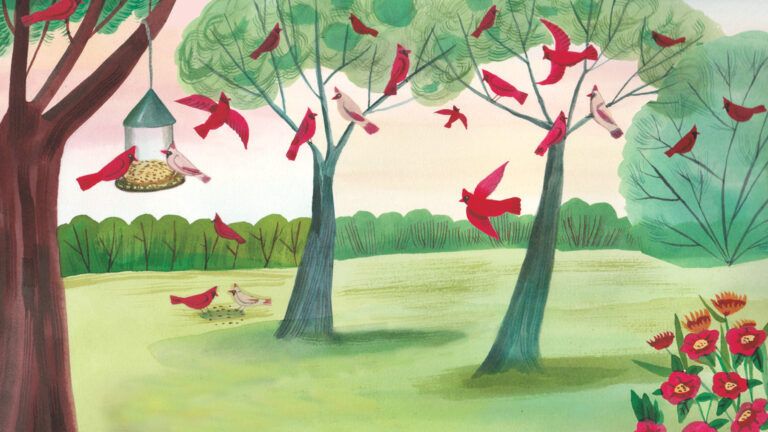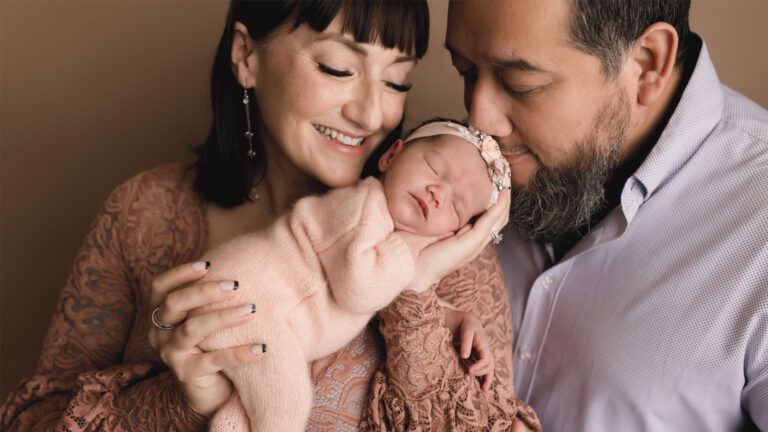”Dad, I can’t find my shoe!”
Joe Dusavage from Wappingers Falls, New York, was getting ready for work when he heard his four-year-old son, Jake, call for him. Joe went to find Jake standing in the middle of his room with only one tennis shoe on.
“Just think,” Joe said. “Where was the last place you had it?”
“I don’t know,” Jake said. “But those are my favorites.”
They searched all over the house—in closets, under beds and couches—but it was nowhere to be found. Joe checked his watch. If they didn’t find it soon, he would be late for work, and Jake would be late for school.
“Jake, I think only God knows where that shoe is.” Joe sighed. Jake suddenly stopped what he was doing and looked upward.
“God, where is my shoe?” he calmly asked.
Jake listened for a second. Then, as if following a direction, he went over to a box of toys in the corner of his room and lifted it up. Underneath his was the missing tennis shoe. Joe watched as Jake put his shoe on and grabbed his backpack—like what he experienced was an everyday occurrence.
Did four-year-old Jake really hear a direction from God? Why was the act of asking so automatic for him? And, if he did hear God, why didn’t it startle him? His story begs the question: Do children have a natural connection to the divine?
Stories in the Bible point to yes. Samuel was only 12 years old when, lying in bed one night, he heard the voice of God calling his name. Josiah was eight years old when he became king of Jerusalem and “did what was right in the eyes of the LORD” (2 Chronicles 34:2). Psalm 127:3 tells us children are a direct gift from God, stating, “Children are a heritage from the LORD, offspring a reward from him.”
If children do have a preternatural connection to God, where does it come from? Children exhibit signs of having a strong connection to the divine even without stepping foot in a church or attending religious classes. And this doesn’t seem to surprise them at all.
Dr. Lisa Miller is a professor and clinical psychologist at Columbia University who studies the scientific understanding of spirituality. She became fascinated with the subject after having her own profound spiritual experiences as a child. She remembers how easy it was simply to open her heart and feel God’s presence. “I could just see the numinousness of life all around me,” she said. In graduate school, she decided it would be her life’s work to understand this.
Dr. Miller studies the psychological impact of a relationship with God in our lives. In her book The Spiritual Child, she focuses on the spiritual lives of children and teenagers. “Children are innately spiritual beings,” she explains. “They naturally connect to God. They can feel guided or know something without being told.”
According to Dr. Miller, our brains have what she defines as “implicit spiritual cognition.” She says her own research, as well as other scientific studies over the last 20 years, points to spirituality being a naturally occurring development in our brains, from both a biological and psychological standpoint. Perhaps most fascinating is her discovery that spiritual cognition appears to be well formed in children and something they are able to easily express. “Spirituality is not something that needs to be taught to children, like math or the piano,” she says. “Children are not blank slates; they have a direct knowing.”
This “direct knowing” can come in the form of mystical experiences, such as a divine dream, hearing God’s voice or having insight into something a child normally wouldn’t know or understand.
Charles Myers from Alameda, California, experienced this firsthand. Charles was leaving church one evening when a little girl, around five years old, came up to him and gave him a flower she had picked. “This is for your mom,” she said. Then she walked away. Charles appreciated the thoughtful gift but didn’t know what to make of it. On his walk home, he suddenly remembered what day it was: June 4. The anniversary of his mother’s death, 10 years before.
“I’d seen the little girl and her family around church, but I didn’t know them well,” Charles said. “There is no way she could have known the importance of that day. It was as if God had impressed on this little girl’s mind to give me a flower.”
This powerful connection to the divine doesn’t stop as we leave childhood. In fact, Dr. Miller says we go through a spiritual surge in our teenage years. “During physical puberty, there is an augmentation in our capacity for transcendent awareness and experiences,” she says. The Bible also points to this. David was still a teenager when he was called by God to defeat Goliath. Timothy was a young adult when Paul took him in as a pupil to help spread God’s word. Mystics throughout history have reported their teenage years as being times of great spiritual awakening. Joan of Arc reportedly began to hear the voice of God at 12 or 13 years old. Saint Therese of Lisieux decided to join a Carmelite convent at the age of 15 due to a miraculous healing during her childhood.
Various religions around the world understand this age to be a spiritually important time. In the Jewish faith, children have a bar or bat mitzvah at 12 or 13 years old. Children in Catholic and some other Christian churches have their confirmation between ages 11 to 17. In the Navajo tradition, teenage girls participate in a spiritual coming-of-age ceremony called kinaaldá that includes blessings and singing.
In her book, Dr. Miller also points to important anecdotal evidence she has found while talking with teenagers about transcendent awareness. During a talk she held at a high school, one student shared a profound spiritual experience she had her junior year while on a hiking trip. The student explained how she was sitting by a lake and suddenly felt connected to everything around her. She described the moment as sacred. “Consider the qualities we associate with the most deeply meditative state or spiritual way of being: love and compassion, mindfulness, acceptance, a sense of oneness with all, and innate connection to nature,” Dr. Miller writes in her book. “The child starts there, in a sacred transcendent relationship.”
One of the most important ways a child’s spirituality manifests is through something else they are born with: wonder. This emotion is a vital part of our spiritual lives. Theoretical physicist Stephen Hawking spoke on the importance of holding on to our “childlike wonder” as we study the universe. That childlike wonder Hawking refers to can strengthen our relationship with God and define how we see the world around us.
Joe Dusavage had an experience with this too, years before the moment with Jake and his missing shoe. It involved his older son, Coleman. Jake, an infant at the time, was being christened at their church. During the ceremony, Coleman, five years old, sat in the pews with his father. Afterward, Coleman tugged on Joe’s sleeve. ”Grandpa Joe and Aunt Julie were here!” he said.
Joe stared at his son, confused. His father, also named Joe, and older sister, Julie, had died years ago. Coleman had heard their names in passing, but he’d never brought them up on his own before. Joe told Coleman that Grandpa Joe and Aunt Julie weren’t there.
“Yes, they were,” Coleman said. “They were standing in the back of the church watching.”
Joe felt comforted knowing his father and sister were there in spirit that day. It was the same for Charles Myers, who took the flower the little girl gave him as a sign from God that his mother was still with him. These moments with children not only provide divine solace, but they show us how God reaches out to us and how we can react. Much like how his brother would respond years later, what Coleman experienced seemed a matter of fact for him. It was simple. Yet Joe was not able to see or hear anything in either case.
Children and teens are more spiritually open to mystical experiences like these because they haven’t yet absorbed society’s tendency to approach mystical experiences with skepticism. “Too often we [adults] step back or actively discourage [children and teens] from cultivating their spiritual selves, in essence train them away from the inquiry,” writes Dr. Miller in her book. As adults actively foster a child’s spirituality, it will help them to maintain that connection into adulthood. Even if as an adult we feel less connected to God, observing young people’s unbridled, nonjudgmental connection with the divine can help us reframe our own spiritual perspectives.
Joe’s thoughts on his son’s experience highlight why it’s important to look to children for our own spiritual growth. “God reaches us through our children,” said Joe, “because children are not clouded with the other distractions of life. They are very much in touch with what they see and feel right in front of them.” Burdens and stress can often distract us from the moments when God is trying to reach out to us. After all, 1 Timothy 4:12 tells us that young people can be an example for us “in speech, in conduct, in love, in faith and in purity.” Perhaps looking at how children innately connect and listen to the divine is an important lesson in how to approach our faith as adults.




